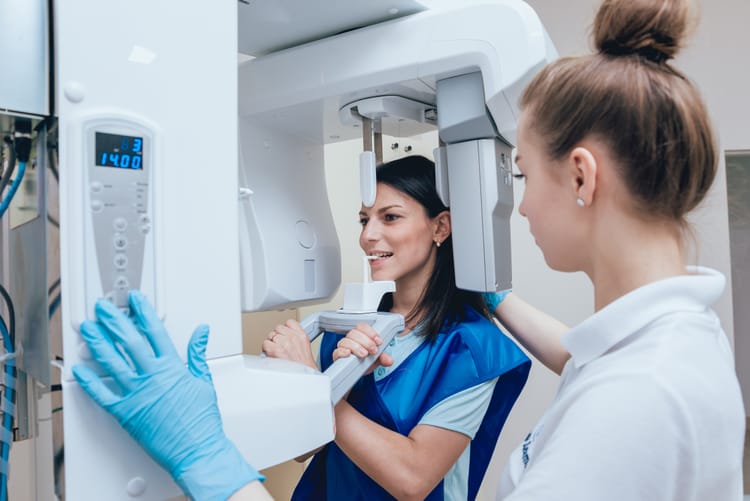Delaying essential care

Are your patients putting off essential dental care? You’re not alone in noticing the trend. New data from KFF highlights just how much rising costs are keeping people from getting the medical and dental care they truly need. It’s a growing concern for providers and patients alike. In this issue, we also step aboard with a dentist working at sea—offering a fascinating peek into a unique career path—and take a closer look at some of the top compliance issues currently shaping the dental industry. It’s a mix of insight, inspiration and practical takeaways you won’t want to miss.


Meet the tooth fairy. If you decide to message the tooth fairy, Dr. Purva Merchant (above), a dentist practicing in Seattle, might answer. Over the course of two decades, she has answered thousands of emails in response to kids and parents. (Credit: Instagram)
Dentistry on the high seas. Dr. Kelsey Smith shared a peek into her life as a Navy dentist stationed on an aircraft carrier.
AI is here to change dental SEO. Many patients find their dentists through a Google search, and the new Gemini AI feature could help revolutionize dental practice SEO.
Dentist on trial for murder. Dr. James Craig, a Colorado dentist, is on trial for allegedly poisoning his wife.
Dentistry goes to Washington. Dr. Divya Mudumba went to Washington, D.C., for the Academy of General Dentistry's (AGD) Hill Day to speak with legislators and advocate for dentistry.

‘You really need written, documented systems’
When it comes to compliance, Kelli (Strand) Ngariki wrote the book on it. Literally. "Good Dentist Poor Dentist" delves into costly compliance risks in dentistry and how dentists can implement effective systems to protect their businesses.
Ngariki, owner and CEO of Healthcare Compliance Associates, spoke with Dental Bite about the compliance issues she sees in dentistry and how to tackle them.
—Carrie Pallardy
What do you think are the biggest compliance issues dental practices face today?
PPE tends to be a big one. A lot of times, from my experience, the people who are the assistants and the hygienists are the safety officers. In general, [they] tend to be rule followers and really don't like when people aren't being held accountable.
I feel that dentists often don't realize that the OSHA rule says that it's the dentist's responsibility to enforce and to make sure that they know what they should be wearing and when to wear it.
Hand hygiene would be the next [issue]. And studies show that. In health care in general, people are washing their hands less than half the time than they should.
Smaller practices—a lot of practices are small—that I've been to do not have written standard operating procedures [or] written systems for how things should be done every time. As a business owner myself, I don't understand how you can know what your staff is doing, what you expect them to be doing. You really need written, documented systems.
How can dentist practice owners evaluate their business’s current compliance management strategy and risks?
There's a great infection control document that the CDC put out that is pretty helpful to review: the Summary of Infection Prevention Practices in Dental Settings: Basic Expectations for Safe Care.
HIPAA is tough. My recommendation would be to spend money on a good IT company. Ask them about their HIPAA knowledge. Try to find companies that are specific to dentistry or to health care because they're more likely to be on top of the HIPAA rules and regulations and changes—because things are definitely changing.
What advice do you have for dentists who want to minimize their compliance risk?
I 100% believe in standard operating procedures, in writing this stuff down. OSHA, HIPAA, infection control: figure out what those guidelines are and what you have to do.
You're creating a step-by-step system for how we do it every single time. Everybody's going to do it this way. It makes it great for training new employees. It decreases your turnover and makes a happier team. You know that everything is being done properly. Safety is prioritized.
Responses have been edited for brevity and clarity.

Are dentists losing the fluoride battle?
Conspiracy theories and doubts continue to chip away at the public health argument for fluoridated water. U.S. Secretary of Health and Human Services Robert F. Kennedy, Jr. continues to champion the cause to remove fluoride from public drinking water. Recent Politico coverage delves into the ongoing debate that counts red and blue states among the fluoride critics and skeptics.
Why it matters: Dentists continue to sound the alarm on fluoride bans, but opponents are gaining ground. If Kennedy succeeds in changing the CDC's guidance on fluoride, opponents would gain a significant victory. (Politico)
The toll health care costs take on Americans
A new brief from KFF digs into how Americans struggle with health care costs. Nearly half of adults in the U.S. (41%) have medical or dental bill debt, and the burden of debt and concerns relating to cost can lead Americans to delay or skip getting health care. Uninsured adults are more likely to avoid care due to cost, but 37% of insured adults have skipped care because of cost concerns.
Why it matters: Skipping dental care can lead to more serious oral and overall health issues, but for many patients, cost is a major barrier. By understanding patients' financial challenges, dental practices can find more compassionate, accessible ways to support them and encourage consistent care. (KFF)
A tooth that can talk to the brain?
Researchers at Tufts University continue to make progress on smart dental implants that feel like the real thing. They have had promising results with implants in rodent models and are now aiming to create implants that will encourage nerve regrowth and enable communication with the brain.
Why it matters: Current implants do not offer the same kind of sensory feedback as a real tooth, but researchers are hoping these smarter implants will be different. (Oral Health Group)

- How one dentist puts patient experience at the center of her pediatric practice
- The curious link between oral health and Parkinson's disease
- Evaluating FQHCs' oral health services
- UK faces criticism for red tape ensnaring overseas-trained dentists
Don't be a stranger.
💠 Reply to this email to connect with our team.
💠 Forward Dental Bite to your colleagues.



